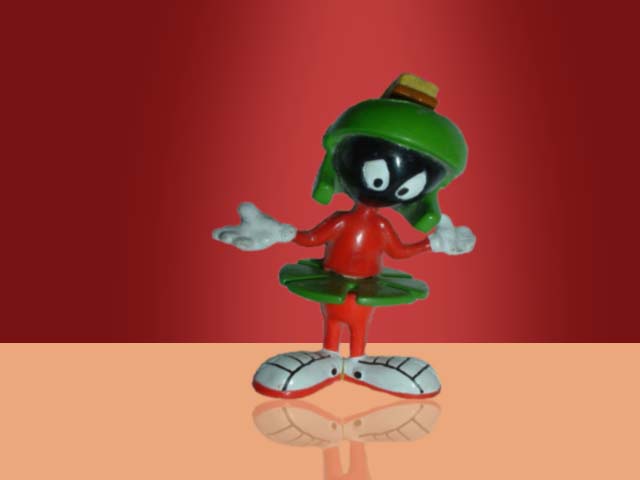
In celebration of the birthdays of Isaac Asimov (designated as National Science Fiction Day) and J. R. R. Tolkien this week, we’re celebrating science fiction words and language all week here at Wordnik. Today’s Word Soup is a special installment of some of our favorite words from and about science fiction television shows.
Warning: some of these quotes may be spoilers for some of you, and, as usual, some words are NSFW.
Slang & Expletives
frak
Ellen Tigh: “You don’t wanna frak with me, Bill. Try to remember that.”
Adama: “Don’t frak with me either, Ellen.”
“Tigh Me Up, Tigh Me Down,” Battlestar Galactic, March 4, 2005
Frak, which replaces expletives such as fuck, shit, and damn, first appeared in the 1978 Battlestar Galactica series as frack. For the “re-imagined” version, frack was revised as frak, since “the producers wanted to make it a four-letter word.” Frak is a play on fuck, and is reminiscent of the intensives, freaking, fricking, and frigging.
Fracking refers to hydraulic fracturing, “a technique in which a mixture of water and sand is forced down an oil well (or similar) in order to create fractures in the oil-bearing rock and thus release more oil.” Fracking was mentioned in “Fracked,” an episode of CSI: Las Vegas, which featured Katee Sackhoff, who portrayed Lt. Kara “Starbuck” Thrace on Battlestar Galactica.
gorram
Mal: “We didn’t pick the cargo.”
Badger: “And I didn’t flash my ass at the gorram law.”
“Serenity,” Firefly, December 20, 2002
Gorram is most likely a corruption of goddamn with what may be a Chinese accent. The show ”takes place in a multi-cultural future, primarily a fusion of Occidental and Chinese cultures,” and as a result, “Mandarin Chinese is a common second language” often used as expletives.
shiny
Jayne [about taking on new passengers]: “Pain in the ass.”
Kaylee: “No, it’s shiny! I like to meet new people. They’ve all got stories.”
“Serenity,” Firefly, December 20, 2002
Shiny in this context means “excellent; remarkable.” Other words that have evolved into slang with a similar meaning include cool, neat, swell, groovy, radical, bitchin, and phat. See this list for more.
skinjob
Tigh: “Before the attack on the Colonies, we didn’t know the skinjobs existed. Turns out there’s another kind of Cylon we didn’t know about, and I’m one of them.”
“Revelations,” Battlestar Galactica, June 13, 2008
Skinjob is a derogatory term for a Humanoid Cylon, “indistinguishable from organic-humans due to their creation through synthetic-biology.” Skinjob pays homage to the film, Blade Runner, which uses skin-job as a derogatory term for replicants, which have similar qualities as Cylons and Humanoid Cylons.
smeg
Rimmer: “Why don’t you smegging well smeg off, you annoying little smeggy smegging smegger!”
“Only the Good,” Red Dwarf, April 5, 1999
Smeg, like frak, replaces other expletives, and was popularized by the British science fiction comedy, Red Dwarf. The word is reminiscent of the word smegma, “a whitish sebaceous secretion that collects between the glans penis and foreskin or in the vulva.” Smegma comes from the Greek word smekhein, “to wash off.”
Enemies & Alternates
Borg
Q: “The Borg is the ultimate user. They’re unlike any threat your Federation has ever faced. They’re not interested in political conquest, wealth or power as you know it. They’re simply interested in your ship, its technology. They’ve identified it as something they can consume.”
“Q Who?” Star Trek: The Next Generation, May 8, 1989
The Borg is “a fictional pseudo-race of cybernetic organisms depicted in the Star Trek universe,” as well as “one who proselytises or assimilates.” The word Borg comes from cyborg, “a human who has certain physiological processes aided or controlled by mechanical or electronic devices.” The word cyborg is a blend of cybernetics, “the theoretical study of communication and control processes in biological, mechanical, and electronic systems,” and organism, “a body exhibiting organization and organic life,” and was coined “in 1960 when Manfred Clynes and Nathan S. Kline used it in an article about the advantages of self-regulating human-machine systems in outer space.”
Cylon
Number Three: “Or would you raise your children with stories of the Cylon, the mechanical slaves who once did your bidding, only to turn against you?”
“Exodus (Part 2),” Battlestar Galactica, October 20, 2006
In the original Battlestar Galactica series, Cylons were not “the mechanical foils” seen in the re-imagined BSG “but an advanced reptilian race who created the robots.” In the re-imagined series, “Cylons were created by humans as cybernetic workers and soldiers.” As for the word’s etymology, cy- comes from cybernetics, while cylon in Latin seems to mean “hollowness of the eyes,” implying the visage of a machine. Derogatory slang for Cylons include bullet-head, chrome job, clanker, and toaster.
Fauxlivia
Walter: “[The password] was a song lyric. And Fauxlivia ruined U2 for all of us.”
Nina: “Fauxlivia?”
Peter: “That’s what Walter’s calling her now. Fauxlivia as in ‘fake Olivia.’”
“Reciprocity,” Fringe, January 28, 2011
Fauxlivia, a blend of faux and Olivia, refers to the alternate universe version of the character, Olivia. Having posed as Olivia, to residents of the primary universe, Fauxlivia is false or fake, ie, not the “real” Olivia. Other faux portmanteaus include fauxhawk, fauxtography, fauxmosexual, fauxhemian, and fauxpology.
reaver
Simon: “What happens if [the reavers] board us?”
Zoe: “If they take the ship, they’ll rape us to death, eat our flesh, and sew our skin to their clothing. And if we’re very very lucky, they’ll do it in that order.”
“Serenity,” Firefly, December 20, 2002
Reavers are “a group of humans in the television series Firefly and the movie Serenity who live on the fringes of civilized space and have become animalistic.” The original meaning of reaver is “one who reaves or robs; a plundering forager; a robber,” and comes from the Old English reafian, “to rob something from someone, plunder, pillage.”
Show Me
Henry Higgins: “I’m gonna need you to Show Me. You know I can’t put this cab into drive without your I.D.”
“Olivia,” Fringe, September 23, 2010
The Show Me is a form of personal identification in the Fringe alternate universe. The phrase show me has various implications. “Show me who you are,” the requester may ask. “This shows me,” the ID holder might say. Show Me is an example of anthimeria, “the use of a word from one word class or part of speech as if it were from another.” Show Me is a verbal phrase used as a noun, turned back into a verb in the quote.
Walternate
Walter: “Walternate found a cure. He found a cure for Peter… and — and it works, Carla. It’s not too late. I can save him.”
“Peter,” Fringe, April 1, 2010
Walternate is a blend of Walter and alternate, and is the alternate universe version of the character Walter.
Fans
Browncoat
Drunk Guy [to Mal]: “Six years [ago] today, the Alliance sent the Browncoats running, pissing in their pants. You know your coat is a kinda brownish color.”
Mal: “It was on sale.”
“The Train Job,” Firefly, September 20, 2002
Browncoats refer to the independence fighters on Firefly (so named for the color of their uniforms) as well as fans of the show. The word is reminiscent of redcoat, Brownshirt, and turncoat.
Dwarfy
“[Norman Lovett] is returning to the role in the current series [Red Dwarf] after an eight-year break, though he has been regularly attending ‘Dwarfy’ conventions in the meantime.”
James Rampton, “Comedy with James Rampton,” The Independent, February 15, 1997
A Dwarfy is a fan of the British science fiction show, Red Dwarf. Dwarfy plays on Trekkie, a fan of the show Star Trek, and may be used as a noun or an adjective.
shipper
“There are a specific sect of ‘Battlestar Galactica’ fans that truly eat [the love storyline] up. They are known. . .as ‘Shippers,’ and if they had their way, Adama and Roslin would be replaced by Victor Newman and Katherine Chancellor.”
Michael Hinman, “Battlestar Galactica’s Young and the Feckless,” Airlock Alpha, February 8, 2007
A shipper is “one involved in shipping (fan fiction based on romantic relationships between characters),” and is short for relationship.
Trekkie
“I am, as I have mentioned before, one of the original Trekkies, who watched the show for the character relationships, the science, and the social commentary (who was it who said science fiction is the modern equivalent of philosophy?), not the fight scenes.”
Kathy Ceceri, “This Trekkie Is Happy,” Wired, May 8, 2009
A Trekkie is a fan of the TV show, Star Trek. The word was coined in 1967 by science fiction editor Arthur W. Saha, and is also known as a Trekker, though some argue Trekkers are truly serious fans while Trekkies are poseurs. A Niner is a fan of the Star Trek spinoff, Star Trek: Deep Space Nine.
X-phile
“We X-Files fans–or X-philes, to be annoying–are double sufferers. Maybe even triple sufferers, since we are afflicted not only by history and by our own fantasies but by ‘creator’ Chris Carter’s as well.”
John Cloud, “Cinema: An X-Phile Confesses,” Time, June 22, 1998
The word X-phile means literally “love of X,” where phile comes from the Greek philos, “loving, dear,” and is a pun of file. Other phile words include bibliophile, a lover of books; cinephile, a movie enthusiaist; Anglophile, “one who admires or is friendly to England”; and many more.
Meta
Riker’s beard
“It really was hard to take Jonathan Frakes seriously that first season of TNG, and it wasn’t entirely because his uniform was a bit too tight. He just looked a bit too much like an overgrown boy scout, and the beard really did help a lot.”
Matt Blum, “10 Geeky Swear Words That Don’t Exist (Yet),” Wired, August 31, 2010
Riker’s beard refers to the phenomenom that before Commander Riker, the character played by Jonathan Frakes, grew a beard, the TV show, Star Trek: The Next Generation, was mediocre. After Riker grew his beard, “the show kicked ass.” The opposite of Riker’s beard is jump the shark, referring to the decline of a show after a ludicrous event.
redshirt
“Being a ‘Red Shirt’ on the USS Enterprise is one of the most dangerous jobs in any (imaginary) military. . . .SiteLogic founder Matt Bailey crunched the numbers: 13.7% of Kirk’s crew died during their three-year televised mission. 73% of the deaths were Red Shirts.”
David Axe, “Star Trek “Red Shirts”: the Harsh, Statistical Truth,” Wired, April 11, 2008
A redshirt is “an unimportant character introduced only to be killed in order to underscore the peril to the important characters; an expendable character.”
Scully
Buffy [to Giles]: “I cannot believe that you of all people are trying to Scully me.”
“The Pack,” Buffy the Vampire Slayer, April 7, 1997
Scully refers to Dana Scully, an FBI agent on the TV show, The X-Files. Whereas her partner, Fox Mulder, readily believed in the paranormal, Scully was always skeptical, casting doubt on Mulder’s seemingly incredible theories. To Scully is to cast doubt on a far-fetched belief. Scully is an anthimeria, “the use of a word from one word class or part of speech as if it were from another,” as well as an eponym, “a word or name derived from the name of a person.”
treknobabble
“Immersed in Treknobabble — the pseudo-scientific tongue spoken in the ‘Trek’ universe — he recalled details from long-ago episodes of the spin-offs ‘Star Trek: The Next Generation’ and ‘Star Trek: Deep Space Nine.’”
Warren Kagarise, “Boldly go: Sammamish actor seeks out new civilizations in ‘Star Trek’ homage,” Issaquah Press, August 10, 2010
Treknobabble is a play on technobabble, “technical jargon.” Technobabble – also known as technospeak – is a blend of technology and babble, and originated in the 1980s, “derived from or inspired by psychobabble, the title of a 1977 book by Richard Rosen.”
This list is by no means complete. What are you some of your favorite words from SF TV?
[Photo: CC BY 2.0 by Hey Paul]

